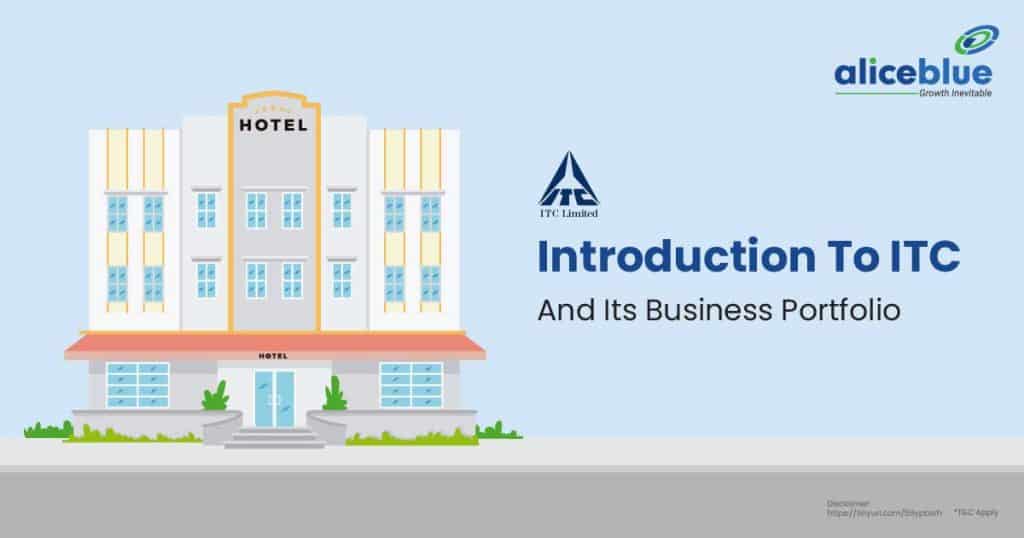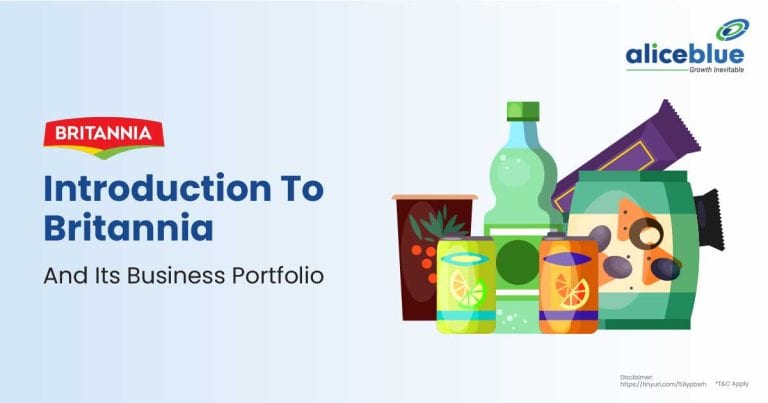ITC Limited is a diversified conglomerate in India, operating across sectors like FMCG, hotels, paperboards, packaging, and agriculture. With flagship brands like Aashirvaad and Sunfeast, ITC leads in innovation, sustainability, and market presence, contributing significantly to India’s economic growth.
Content:
- What Does ITC Do?
- Popular Brands In The ITC FMCG Sector
- Leading Brands Of ITC Hotels In India
- Top Brands of ITC’s Agriculture Business Sector
- ITC Business Under Paper Product
- Other Business Sectors of ITC
- How Did ITC Diversify Its Product Range Across Sectors?
- What Is The Contribution Of ITC In India?
- How To Invest In ITC Stock?
- Future Growth And Brand Expansion By ITC
- Introduction To ITC – Conclusion
- Introduction To ITC And Its Business Portfolio – FAQs
What Does ITC Do?
ITC Limited is a leading Indian conglomerate operating in diverse sectors including FMCG, hotels, paperboards, specialty packaging, agribusiness, and information technology. Established in 1910, ITC is known for its sustainability initiatives and a strong portfolio of iconic brands like Aashirvaad, Sunfeast, and Classmate.
ITC began as the Imperial Tobacco Company of India, founded in 1910, focusing on the tobacco business. Over decades, it diversified into multiple sectors, transforming into a conglomerate. Its headquarters are in Kolkata, India, and it has significantly contributed to the country’s economic growth.
The company is publicly owned, with significant institutional and retail shareholders. ITC emphasizes innovation, sustainability, and value creation across its businesses. It leads in the FMCG, agribusiness, and hospitality sectors, driving responsible growth while catering to diverse consumer needs and enhancing shareholder value.

Popular Brands In The ITC FMCG Sector
ITC’s FMCG sector boasts iconic brands like Aashirvaad, Sunfeast, Bingo!, and Yippee!, catering to food, personal care, and lifestyle needs. These brands leverage ITC’s strong distribution network and innovation to dominate their respective categories in the Indian market.
Origins and Development: ITC entered the FMCG sector in the 2000s to diversify from its tobacco base. The Aashirvaad brand, launched in 2002, marked its foray into packaged foods, eventually expanding into personal care and beverages. Current initiatives focus on health and wellness.
Market Share and Global Presence: ITC’s FMCG brands hold a significant share in India, with Aashirvaad leading in packaged atta and Sunfeast in biscuits. Their products are also exported to key global markets, reflecting ITC’s commitment to quality and innovation.
Leading Brands Of ITC Hotels In India
ITC Hotels is a premium hospitality brand offering luxury under names like ITC Maurya, ITC Grand Chola, and Welcomhotel. Known for sustainability and world-class service, it represents ITC’s commitment to “Responsible Luxury” in the Indian hospitality industry.
Origins and Development: ITC entered hospitality in 1975, opening its first hotel, ITC Maurya in Delhi. It aimed to complement its tobacco and agribusiness ventures by venturing into luxury and hospitality, prioritizing eco-friendly practices.
Market Share and Presence: ITC Hotels is among India’s leading hospitality chains, with over 100 properties across the country. Its focus on sustainability and culinary excellence has earned it global accolades and a loyal clientele.
Top Brands of ITC’s Agriculture Business Sector
ITC’s agribusiness sector operates brands like ITC e-Choupal and Agri Solutions, bridging the gap between farmers and global markets. These initiatives empower farmers with technology and enhance agricultural productivity, ensuring sustainable and inclusive growth.
Origins and Development: ITC started its agribusiness in the 1990s to secure raw materials for its cigarette production. The e-Choupal initiative, launched in 2000, digitized agricultural supply chains, transforming rural India’s agrarian economy.
Market Reach and Impact: ITC Agri Solutions has expanded globally, exporting wheat, rice, and coffee. With e-Choupal covering 35,000 villages, it benefits over 4 million farmers, making ITC a leader in sustainable agribusiness.
ITC Business Under Paper Product
ITC’s paperboards and packaging division produces eco-friendly products under brands like Safire Graphik and Omega Series. With a focus on sustainability, ITC is a market leader in premium paperboards, catering to FMCG, pharma, and publishing industries.
Origins and Development: ITC entered the paper sector in the 1970s, driven by its need for cigarette packaging. Over decades, it expanded into paperboards, leveraging innovation to create biodegradable and recyclable solutions.
Market Share and Sustainability: ITC leads in India’s paperboard sector, holding over 25% market share. Its products are exported to global markets, with sustainability initiatives ensuring minimal environmental impact, aligning with ITC’s green business ethos.
Other Business Sectors of ITC
Apart from FMCG, hotels, agriculture, and paper products, ITC operates in IT services through ITC Infotech, lifestyle retail with Wills Lifestyle, and safety matches with brands like Aim. These businesses reflect ITC’s diversification and commitment to innovation, sustainability, and value creation across multiple industries.
ITC Infotech began in the early 2000s to leverage technology for business transformation. Wills Lifestyle, launched in 2000, diversified ITC’s presence into premium apparel retailing, catering to lifestyle-conscious consumers. Both ventures illustrate ITC’s strategic expansion beyond core industries.
ITC Infotech serves global clients, contributing significantly to ITC’s non-cigarette revenue. Wills Lifestyle established a niche in urban markets, while ITC’s safety matches dominate rural India. Together, these sectors reinforce ITC’s brand value and market leadership.
How Did ITC Diversify Its Product Range Across Sectors?
ITC diversified by leveraging core competencies in tobacco and agriculture to enter FMCG, hotels, and paper products. Investments in innovation, R&D, and sustainability helped ITC build a robust portfolio of products catering to diverse consumer needs across industries.
ITC transitioned from tobacco to FMCG in the 2000s, launching brands like Aashirvaad and Bingo!. It ventured into hotels to leverage its agribusiness network and into paper products for sustainable packaging solutions, meeting market demands strategically.
Today, ITC’s non-cigarette revenue contributes over 60% to its overall turnover. Diversification not only reduced dependency on tobacco but also strengthened ITC’s reputation as a multi-sector conglomerate with significant economic contributions.
What Is The Contribution Of ITC In India?
ITC contributes to India’s economy through employment generation, tax revenues, rural development, and sustainability initiatives. Its investments in agri-supply chains, education, and healthcare uplift millions, while iconic brands like Sunfeast and Aashirvaad cater to diverse consumer needs.
ITC is one of India’s largest taxpayers and employers, directly and indirectly supporting millions of livelihoods. Its agribusiness, through e-Choupal, empowers rural farmers by improving market access and productivity.
ITC is a carbon-neutral company with investments in renewable energy, water conservation, and afforestation. These efforts align with India’s environmental goals, showcasing ITC’s commitment to sustainable development alongside economic growth.
How To Invest In ITC Stock?
Investing in ITC stock requires a Demat account and trading platform. Research ITC’s fundamentals, financial performance, and industry trends before purchasing shares through Alice Blue. ITC’s stable dividends and diversified portfolio make it a preferred choice for long-term investors.
ITC is a blue-chip stock offering consistent returns, strong fundamentals, and growth potential across multiple sectors. Its focus on sustainability and innovation adds value, making it an attractive option for risk-averse and growth-focused investors alike.
ITC has shown steady price appreciation and regular dividends, making it a reliable investment. As ITC expands its non-cigarette business, it continues to attract institutional and retail investors, ensuring strong market performance.
Future Growth And Brand Expansion By ITC
ITC aims to expand its FMCG portfolio, invest in premium hotel properties, and strengthen its agribusiness globally. With a focus on sustainability and digital transformation, ITC plans to innovate across sectors while maintaining leadership in core markets.
ITC is investing in plant-based products, biodegradable packaging, and digital supply chains to enhance customer experience. Its efforts align with consumer preferences for sustainable and tech-driven solutions, ensuring long-term growth.
ITC seeks to strengthen its international presence, especially in FMCG exports and hospitality. By leveraging its brand equity and innovation, ITC aims to become a globally recognized name across multiple industries.
Introduction To ITC – Conclusion
ITC Limited, established in 1910, evolved from a tobacco company to a diversified conglomerate operating in FMCG, hotels, agriculture, and paper products. With iconic brands and sustainability initiatives, ITC contributes significantly to India’s economy and global markets.
ITC’s transformation is marked by strategic diversification and innovation. From Imperial Tobacco to a multi-sector powerhouse, ITC exemplifies adaptability and vision, becoming one of India’s most respected corporations.
ITC aims to continue its leadership across sectors by investing in technology, sustainability, and global expansion. With a robust business model and strong market presence, ITC remains a vital contributor to India’s growth story.

Introduction To ITC And Its Business Portfolio – FAQs
The full form of ITC is Indian Tobacco Company, reflecting its origin in the tobacco industry. Over time, ITC diversified into FMCG, agriculture, paper, and hospitality, becoming a leading Indian conglomerate.
ITC owns popular brands like Aashirvaad (flour), Sunfeast (biscuits), Bingo! (snacks), Yippee! (noodles), and Classmate (stationery). These brands cater to diverse consumer needs and hold leadership positions in their respective categories.
The main objective of ITC is to create sustainable value for stakeholders through innovation, diversification, and excellence. ITC focuses on sustainability, rural development, and responsible business practices while contributing significantly to India’s economic growth.
ITC operates a diversified business model across FMCG, hotels, agribusiness, paper, and IT services. It integrates sustainability, innovation, and quality to create value, leveraging its strong supply chain, brand equity, and market presence.
ITC’s FMCG brands include Aashirvaad, Sunfeast, Bingo!, Yippee!, Fiama, Vivel, and Savlon. These brands dominate markets in packaged food, personal care, and home hygiene, showcasing ITC’s leadership in the FMCG sector.
To invest in ITC, open a demat account with Alice Blue, research ITC’s financials and industry trends, and buy shares on stock exchanges. ITC’s consistent dividends and diversified portfolio make it a reliable investment option.
ITC’s valuation depends on its growth potential in FMCG and other sectors. Analysts evaluate its price-to-earnings ratio, market sentiment, and future prospects. Currently, ITC’s diversification and consistent performance make it attractively valued for long-term investors.
Disclaimer: The above article is written for educational purposes and the companies’ data mentioned in the article may change with respect to time. The securities quoted are exemplary and are not recommendatory.









